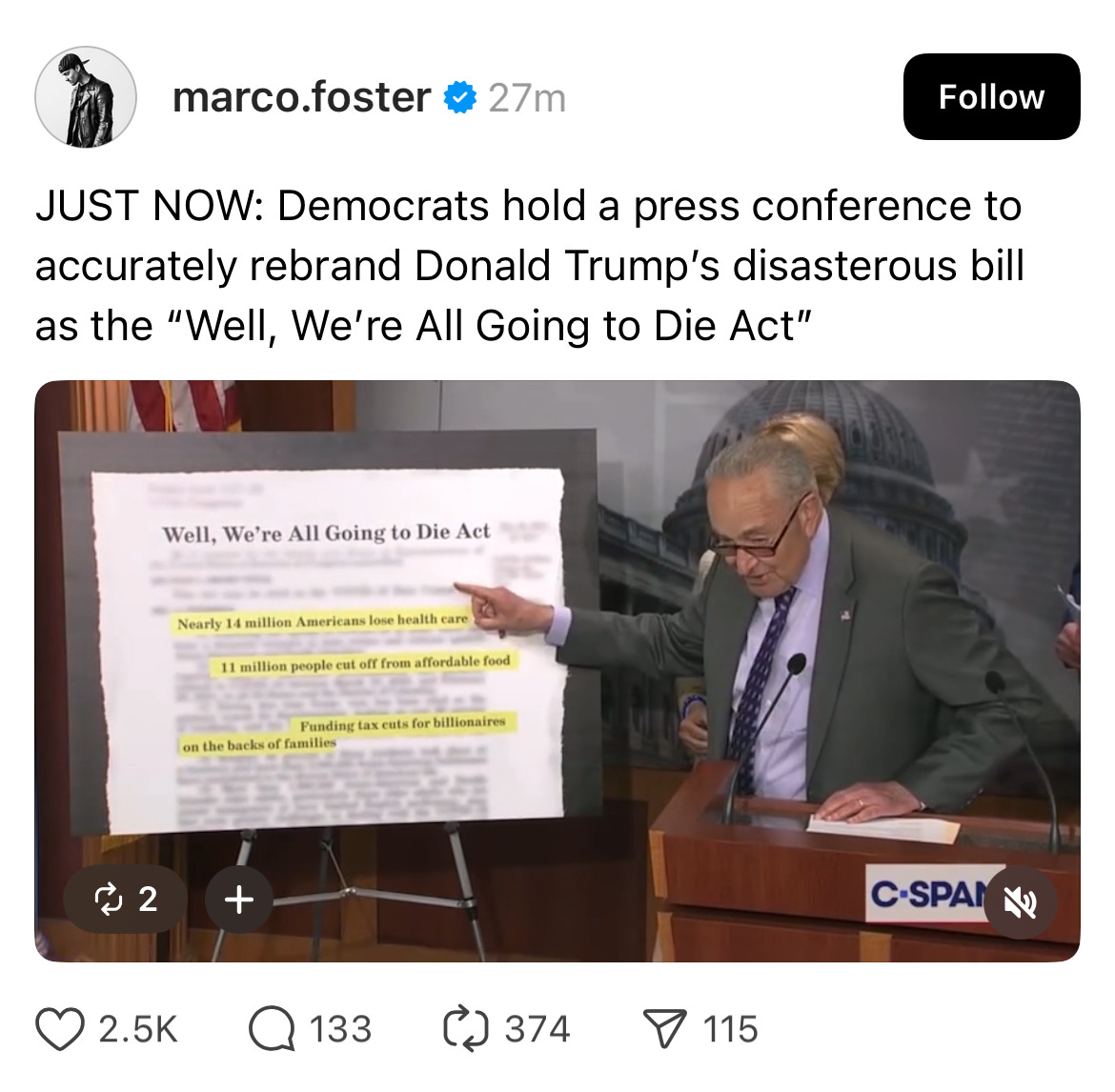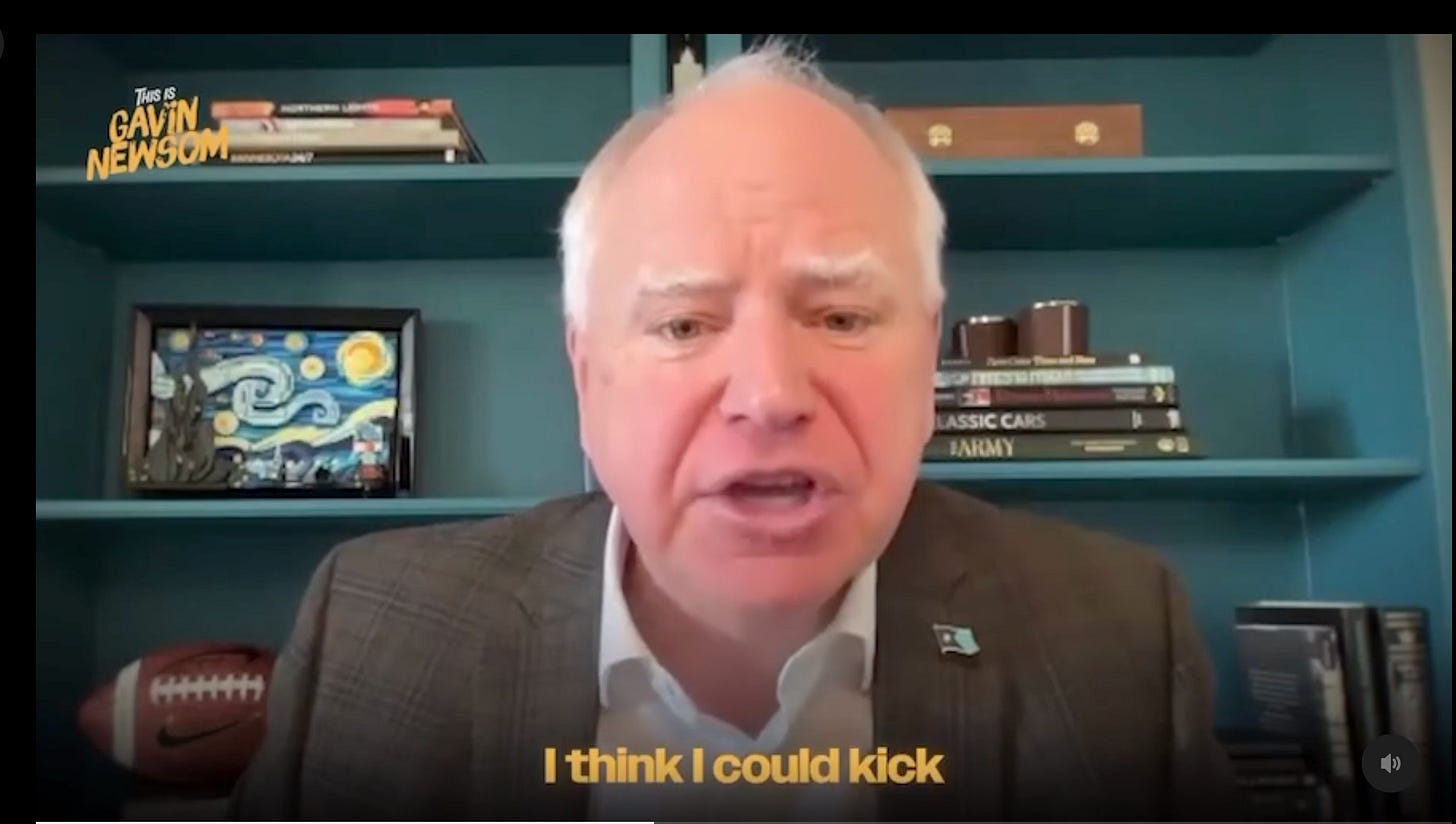So, you’ve publicly condoned a politician’s actions
Prayers to our lady of perpetual embarrassment.
I recognize that the world’s richest man and the world’s most powerful man are currently tearing each other apart, but I’ve spilled enough ink on the two of them, and I was right. Today, I need to talk about a time I was wrong.
A few months ago, Senator Cory Booker took himself to the Senate floor to filibust his way through some records. He held the floor for over 25 hours, not to hold up any specific legislation, but to call attention to how the Trump administration had already inflicted untold1 damage on the American people. (Pointedly, he kept his focus pretty domestic.) At that time, I was surprised at how much this grandstanding and speechifying affected me. To quote,
“I’m by no means saying that one filibuster has saved democracy, or that the American version of democracy we’ve been rocking with is remotely adequate. But it feels like an exciting piece of a larger call to action. It’s not kneeling while wearing kente cloth, which was so pathetically stupid. It’s not naming a bill “Stop the Steal” and doing a Muttley giggle at your own cleverness, which actually made me want to swallow my own thumbs. This filibuster feels like someone finally decided to do something significant, when so many powerful people are content to do and say nothing meaningful. Jimmy Stewart would be proud.”
Since that filibuster, we actually have seen a number of good political stunts. Senator Chris Van Hollen travelled to El Salvador, ostensibly to bring Kilmar Abrego Garcia home, but really to keep attention on how the government illegally rendered him to a notorious mega-prison. Newark Mayor2 Ras Baraka was illegally arrested for protesting at an ICE detention center, and his legislator comrades stayed at the protest to keep amplifying how laughably flagrant this act of intimidation was. Of course, Democratic Party leadership has continued to do whatever you call this:
Meanwhile, the filibusterer himself has sat on the steps of the Capitol with Hakeem Jeffries to “protest” the GOP budget; been the only Democrat to vote to approve Trump nominee Charles Kushner—a convicted tax evader, blackmailer, witness tamperer, and terrible fucking brother—as ambassador to France; and, most recently, announced his book of/about his filibuster speech. This is simply not the “good trouble” John Lewis was talking about, friendo.
One point I didn’t make strongly enough in my original piece is that I have genuine political reasons to dislike Cory Booker, along with my vibes-based reasons. Like, he is a student body president-ass cornball to an almost-unholy degree, but that’s not his worst fault. His worst fault is being a Career Politician™️, for whom the prestige and power of the position is the entire endgame. He doesn’t have a signature policy or position that people associate him with, the way people associate Bernie Sanders with taxing billionaires and hating identity politics that don’t align with his preferred identities. He doesn’t have the trust and support of his constituents, the way Rashida Tlaib does, even as—perhaps because!—she breaks ranks with her party. He’s not even associated with a crew who share ideological beliefs, like the members of The Squad are. He’s just a politician who wants to be a politician, but to what end? TO WHAT END.
I can know all of that and still think that the filibuster was a good bit of political theatre. Entirely performative, yes; but unfortunately, politics requires performance. Whichever politician you think doesn’t do performative shit at least some of the time is simply crushing a performance that was made for you to like, and signaling authenticity in a way that appeals to you. Tim Walz sharing Mad Men memes about the Big Beautiful Bill and telling spray-tanned jellyfish Gavin Newsom that he wants to physically fight manosphere podcasters, for instance, is part of a performance custom-made for me.
So, yes, I still think Booker’s filibuster showed a canny understanding of his audience and potential impact. And at the time, I clocked that one of his goals was to set himself up as a possible 2028 presidential candidate, which feels as inevitable as it does soporific. But he also clearly intended it as cover for his past voting record, which is spineless and lackluster at best; as well as the increasingly hideous votes he would go on to make. And for some reason, even though I knew all the political reasons I didn’t like him, I let the strength of a performance that wasn’t even for me outweigh all of that.
I don’t necessarily regret how I felt about that filibuster. My politics depend on believing in the possibility of momentum building off the glimmers of good I see, when I do see them. What I absolutely regret is helping provide cover for someone who seeks to block that very momentum if it conflicts with his career aspirations. I regret that because my politics also depend on accountability. Especially my own! To that end, thank you to the friends who reached out—texts, DMs, live chats, and one angry phone call—to disagree with my original take. Not to be all “I am listening, I am learning,” but I actually am listening.
untold as in, boundless; and as in, pretty much un-discussed by the media.
Is a political theatre major a prerequisite for holding this specific office?








I’m still glad that the longest filibuster is no longer about keeping slavery but that’s about the only positive that remains
I’m holding space for this, friend